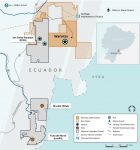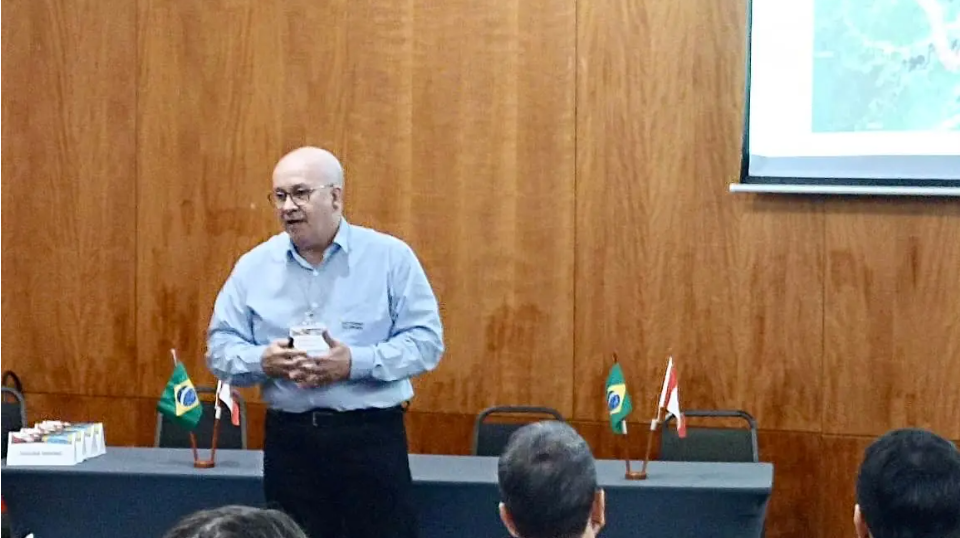
On Monday September 12, 2022, Adriano Espeschit, president of Brazil Potash presented the Autazes Project to representatives of the Canadian government and Canadian companies at an event called “Breakfast Procurement Needs” held at Mercure Lourdes hotel in Belo Horizonte.
“The event was organized by the government of Canada, which brought Canadian companies interested in new projects here in Brazil. Then, several companies presented their projects. And Potássio do Brasil made a point of being present presenting the Potássio Autazes Project”, said the president of Brazil Potash.
At the event, there were representatives from the federal government of Canada, the Mining Suppliers and Trade Association, the Province of Québec, and the Chamber of Commerce Brazil/Canada. In addition, several Canadian companies sent representatives to participate.
The Autazes Project is a sustainability engineering investment for the production of Potassium Chloride – an important fertilizer for Brazilian agribusiness – in the municipality of Autazes. The distance from Manaus is 112 km.
The project will employ a process for extracting Silvinite, a rock made up of halite (salt) and Silvita (potassium chloride), which will not harm the earth’s surface soil or environment. The chambers and pillars technique will be utilized throughout the entire extraction operation.
In order to remove the ore, which is approximately 800 meters deep, the company will need to excavate two shafts. The Silvinite ore will be brought to the surface through these wells, and processed so that the Potassium Chloride (fertilizer) can be separated from the Sodium Chloride (kitchen salt).
After the separation of Potassium Chloride and Sodium Chloride, the fertilizer will be transported via barges from a private port that is to be built by the company on the bank of the Madeira River. The market they are aiming this product toward is Brazilian agribusiness consumers.
“The Sodium Chloride will be stored in an impermeable place to protect the soil and the water table, and then it will return to the subsoil, filling the open chambers, that is, there will be no residues on the surface at the end of the Project’s useful life”, explains the president of Brazil Potash.
The project, which is now in the environmental licensing stage, has a predicted useful life of more than 23 years and will put Amazonas state among Brazil’s top fertilizer producers. When it reaches the average annual production of 2.4 million tons of Potassium Chloride, this input will meet roughly 20% of Brazilian demand. Preliminary studies, on the other hand, indicate that production capacity may be expanded up to 45% of Brazilian demands. The project will be soon implemented, and in turn, guarantee tax revenues for the Municipality, State and Union.
As a result, Brazil Potash will aid in the reduction of dependency on imports from countries such as Canada, Russia, Belarus, Germany, and Israel. It’s worth noting that Brazil is at present the world’s second-largest consumer of potassium but only produces 5% of its consumption need.
Potássio do Brasil Ltda. (controlled by Brazil Potash) is a private Brazilian company that manufactures fertilizers. It has been present in the Amazon region since 2009 and has British, Australian, Canadian and Brazilian investors with more to come as the project expands. The potassium ore will be extracted and treated in Amazonas before being turned into fertilizer.
The Autazes Project is in the environmental licensing phase with the Institute for Environmental Protection of Amazonas (Ipaam) as the competent body to license projects in Amazonas state. The LP is available, and the Installation License is pending.
The above references an opinion and is for information purposes only. It is not intended to be investment advice. Seek a licensed professional for investment advice. The author is not an insider or shareholder of any of the companies mentioned above.
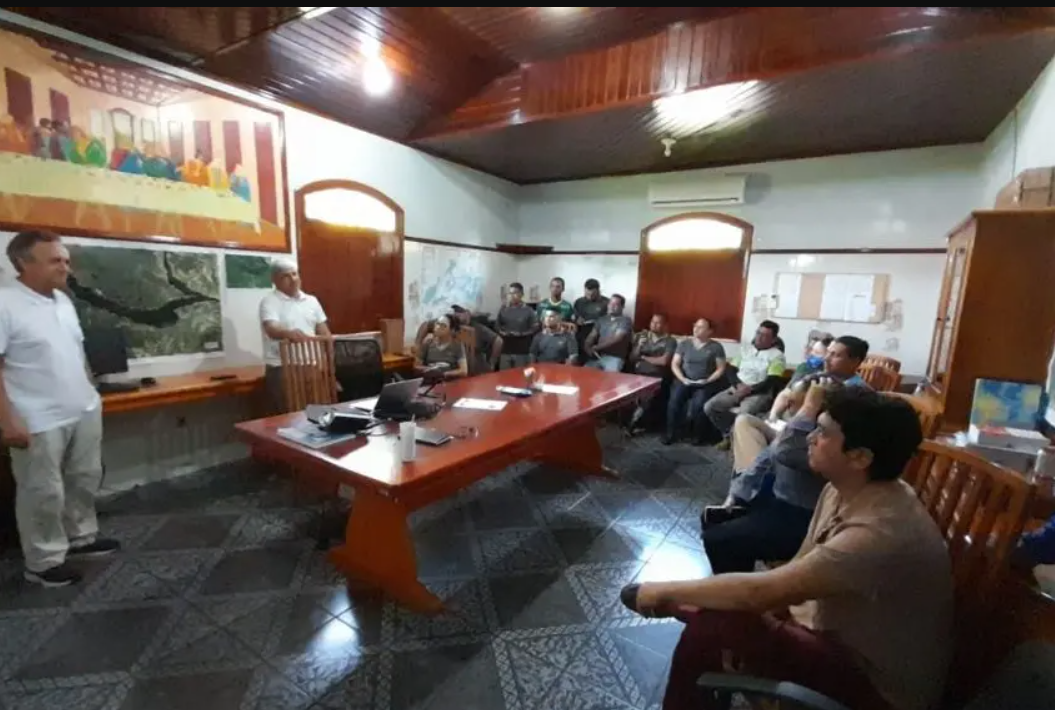
Brazil Potash recently presented its flagship Autazes Potash Project to students in the Technical Surveying Course at the Centro Tecnológico do Amazonas (CETAM). The centre trains professionals in mapping which is fundamental to engineering projects. This was an opportunity for students to learn about the project, an important potash project in Brazil, currently in the licensing phase.
Lúcio Rabelo, the director of ESG at Brazil Potash, said the presentation demonstrated to students the influence of the Autazes Potash Project on society, the economy, and the environment. According to Rabelo, CETAM students will have an opportunity to apply what they learned in the course when they participate in the Project.
Lucio Rabelo commented: “These are young people who are graduating, receiving a qualification, who will have the opportunity to apply the knowledge they are receiving. They verified that, indeed, many opportunities will arise to help, in the great project that is being implemented here, so that the municipality can develop.”
At the moment, the Autazes Potash Project is in the environmental licensing stage. It has a prior license (LP) and is waiting for an installation license (LI) as a result of a legal agreement, at the Federal Court, between the firm and the Mura People, which was launched in 2019. The enterprise continues to be open to discussion with society about how the Autazes Potash Project can serve as one of Amazonas’ future development models.
The project will create 2,600 direct jobs every year during implementation Then, once the Potassium Chloride factory is operational, working from the soil of the Autazes Potash Project, 1,300 direct jobs will be created, as well as 17,000 indirect positions.
The finalist students were in attendance and the presentation was part of the last module of the course: Practices II, led by professor and engineer Márcio Góes. Professionals who will be responsible for mapping are educated during the Surveying course.
Mr. Góes commented: “I think this is something magical for us because we live in a region of magnitude, when it comes to geography, gigantic, with little investment. When we see a project like Autazes Potash Project, we are sure that the Amazon is here to make a difference in the world, with all our trees standing. And we come to believe when we know a project like this, that it is possible, yes, to bring progress keeping our forest, our fauna and our flora intact.”
The professor noted that it’s nice to see a project that improves the region, in addition to offering tremendous possibilities and infrastructure. He also said he has two perspectives on the Autazes Potash Project: one as a teacher and one as a riverside caboclo.
After the conclusion of the Project presentation, Fabiana Oliveira, coordinator of CETAM in Autazes, stated that she was satisfied. “I leave here with my heart overflowing with joy to know that we are included and that it is going to have a wonderful impact. We really need to know. When we know, our hearts are calmer, knowing we are on the right path,” she said.
The presentation of the Autazes Potash Project is vital for student Adriano Gomes since it gives him direction in his professional future and transforms people’s perception of the Project. “I arrived here and heard many people talking about the Potassium issue. And, today, we leave here with another mentality, which is really something that comes to add to our municipality, to our community. For us, who are leaving now, graduating, it is something very hopeful, where we will have our share of contribution”, he explained.
The above references an opinion and is for information purposes only. It is not intended to be investment advice. Seek a licensed professional for investment advice. The author is not an insider or shareholder of any of the companies mentioned above.
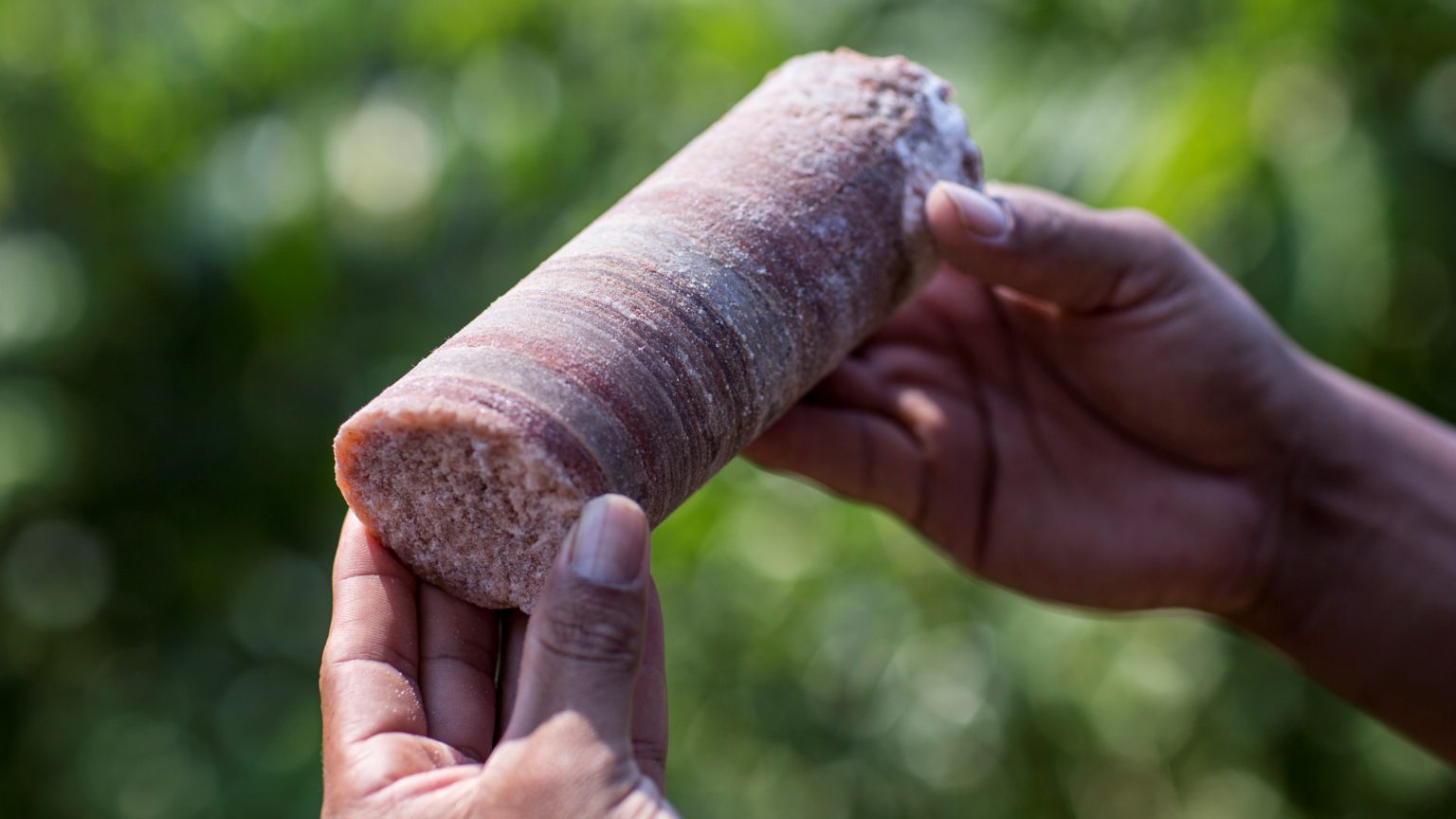
Brazil Potash Corp. has announced the closing of its Regulation A, Tier 2 offering of common shares, no par value per share, as of the end of July 2022. The company raised over US$40 million, and is well capitalized for ongoing operations as it prepares to increase output at its flagship Autazes Project.
Brazil Potash is an extraction company currently preparing for the implementation of the Autazes Potash Project 120 km southeast of Manaus. The company will serve customers in the agricultural sector of Brazil and intends to produce more than 20% of potash consumed by Brazil annually. Brazil Potash is still in the pre-revenue development stage and has not commenced mining operations yet.
Brazil Potash is aiming to reduce the strain of the global demand for potash amid record prices and global demand. The current record prices of potash are the result of a combination of increased global demand for potash and sanctions against Russia and Belarus, which hinder their ability to export potash. Since Russia and Belarus historically supply approximately 40% of the world’s potash, the current sanctions have further reinforced the need for domestic potash production in Brazil to help ensure global food security.
Potash prices have remained above $1,100 USD per tonne and Brazilian demand is currently robust, with imports of potash increasing 42% year over year to 3.1 million tonnes in the first quarter of 2022, according to Reuters.
The company’s management team, backed by a group of third-party experts, also recently finalized Brazil Potash’s Environmental, Social and Governance (ESG) report. The report confirms management’s beliefs that the Autazes Project will be one of the most environmentally clean potash projects in the world, emitting 79% less greenhouse gas emissions than existing potash producers. The report will be made available on the company’s website soon.
The Autazes Project is making a huge impact in the fight against climate change by reducing greenhouse gas emissions. The project will get 85% of its energy from renewable sources, and the company will avoid unnecessarily long distances when transporting its produced potash.
Autazes has support from all levels of the Brazilian government. The Brazilian Minister of Agriculture recently visited Canada to meet with fertilizer companies including Brazil Potash. The minister asked what the country could do to help accelerate the construction of the Autazes Project while offering support for the companies present and the industry in Brazil.
Beyond this visit, the Governor of Amazon, Wilson Lima, met with Adriano Espeschit, President in Brazil, and it´s ESG Director Lucio Rabelo to get an update on the project. The engagement and support from the Brazilian government reflect a strong initiative to bring new potash projects online in the country and reduce Brazil’s reliance on imports as soon as possible.
Brazil Potash has also engaged ERCOSPLAN, a German engineering firm, to update the company’s technical report and feasibility study for Autazes. The initial technical report and feasibility study were done by WORLEY in 2016 with strong support and participation from ERCOSPLAN.
The above references an opinion and is for information purposes only. It is not intended to be investment advice. Seek a licensed professional for investment advice. The author is not an insider or shareholder of any of the companies mentioned above.
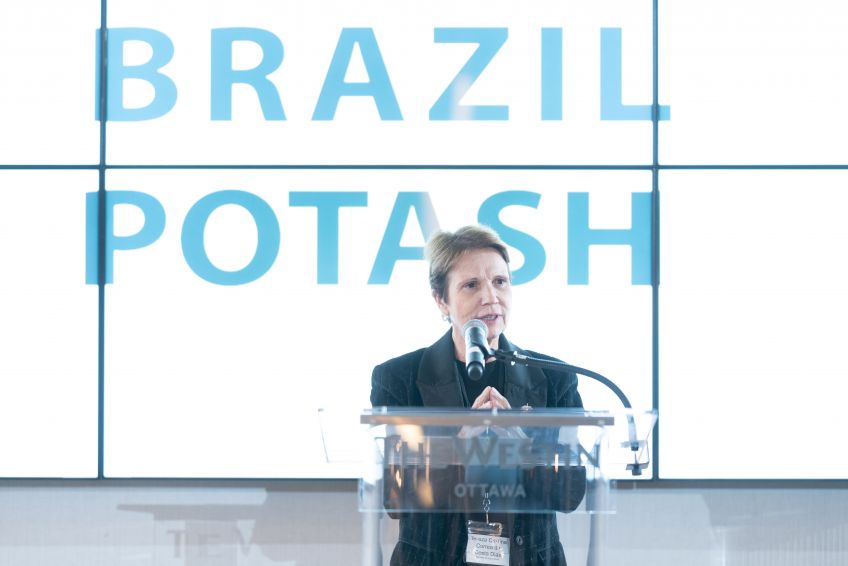
Brazil Potash, a Canada-based potash mining company, has put forward a bold vision for a bold new potash project in Brazil that aims to both challenge the oligopoly entrenched in the industry and create a better future for Brazil. That project is the Autazes Project.
Potash Mining
Currently, there are two main ways potash is mined – conventional and solution. Conventional mining entails the sinking of shafts to reach the underground potash and the use of boring machines to extract it for transport to the surface where it is concentrated into a saleable product. With solution mining, hot water is piped down to the underground potash to dissolve it for transportation back to surface for processing.
The state of the potash market is currently controlled by a small group of companies, known as an oligopoly. This control gives these companies a large amount of power over price and availability. Brazil is one country that is highly dependent on imported potash – the country imports 96% of the potash it needs out of which 47% comes from Russia and Belarus which are both sanctioned. This leaves Brazilian agriculture at the mercy of these foreign suppliers.
Brazil Potash will aim to challenge that market by introducing a new project with multiple competitive advantages. The first is the sheer size of the Amazon potash basin that Brazil Potash’s Autazes project will source its potash from. The Amazon potash basin is estimated to be one of the largest proven potash fertilizer projects in the world, comparable to the massive potash basins in Canada and Russia where ~80% of the world’s potash is sourced.
The project also has a major logistical advantage because it will be located on existing farmland near the Amazon river system. Thanks to the favourable infrastructure, ideal location, and a successful feasibility study and environmental and social impact assessment already complete, the Autazes project will be the lowest-cost source of potash for Brazil – a major shift for the industry and the country.
Currently, the company sees a life of mine of 23 years based on exploring only ~7% of the Amazon potash basins potential, with an estimated annual EBITDA of US$ 1.1 billion. Once the mine is producing, this could give the Brazil Potash an approximate market cap between US$ 7 billion and US$ 10 billion based on just its initial planned production of 2.4 million tonnes per year to supply ~20% of Brazil’s current needs.
Autazes
The Autazes project is designed to be more than a game-changing potash mine. The company sees the project as an impact project with benefits across multiple social and economic factors. The project will create around 5000 direct and indirect jobs over several decades of operation that will have a positive impact on the local and regional economy.
Brazil Potash has a strong ESG policy in place, with plans for investing in local school programs, ensuring that no primary rainforest is affected by the project (small footprint) and that the potash supply will go on to facilitate the reuse of the existing arable land to help mitigate deforestation further. The company has estimated that the project will reduce greenhouse gases by more than 1.3 million tonnes per year.
Potash mining is a capital-intensive process, but with a strong project and a favourable market, Brazil Potash is well-positioned to take on the challenge and become a new player in the potash industry.
Roadmap Underway
Brazil Potash has brought its Autazes project to a near construction-ready state having completed a bankable feasibility study, environmental and social impact assessment, and public hearings with over 4000 people including currently ongoing indigenous consultations.
The next stage will see the company raise the US$ 2.1 billion needed for the construction of the Autazes Project to bring it into operation to supply this essential nutrient to feed not only the people of Brazil but people globally.
The above references an opinion and is for information purposes only. It is not intended to be investment advice. Seek a licensed professional for investment advice. The author is not an insider or shareholder of any of the companies mentioned above.

According the United Nations, the world’s population is projected to reach 9.8 billion by 2050 and 11.2 billion by 2100. Countries will need to maximize resources and reduce their reliance on imports to feed their citizens. This reality, in turn, is creating opportunities for companies to play an important role in developing the necessary infrastructure to make agriculture sustainable and reduce carbon emissions.
This year, Brazil Potash, a potash mine development company located in Brazil, received the “Top Engenharia” award as the most recognizable engineering project currently underway in the country’s agribusiness sector by the Federal University of Minas Gerais (“UFMG”) Alumni Association. Every year, UFMG conducts a survey of over 3,000 alumni of its Engineering School, asking them to identify which companies in each sector demonstrate engineering excellence. Brazil Potash’s Autazes project stood out not only for the critical infrastructure it would provide, but also the environmental benefits it will bring.
Potash is an essential nutrient to growing food with no substitute and is therefore vital to feeding the rising global population. At 8.8MTpa of consumption, Brazil is the world’s second largest and fastest growing market for potash, but imports 95% of its needs from mines located 14,000 to 20,000 kilometers away.
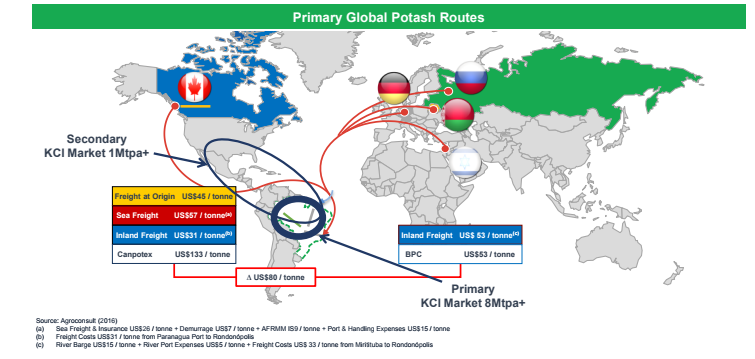
Brazil Potash holds exclusive title to a world-class scale potash basin located in the Amazon State of Brazil only 8 kilometers from a major river system that will be used to transport initial planned production of 2.4MTpa on river barges to farmers in Brazil. Based on today’s depressed global oil prices and shipping rates, Brazil Potash is able to mine, process and deliver its potash for the same cost as importers logistics costs alone. This substantial and sustainable logistics cost advantage will increase with anticipated global raising oil prices and results in a Green House Gas (GHG) emission savings of roughly 508kTpa. This project could substantially reduce the country’s reliance on potash imports, while enhancing food security, increasing crop yields and improving supply chain management for Brazilian farmers.

Brazil Potash plans to bring its Autazes potash deposit into production in a low-density cattle farming region of the Central Amazon Basin. Autazes is located 120km southeast of Manaus (population 1.8 million), which is the major economic hub in the region with an international airport. This project will create thousands of good jobs for people, providing stable and secure sources of income in a region with few jobs.
Brazil Potash has completed a Bankable Feasibility Study (BFS), Environmental Impact Assessment (EIA), obtained the Preliminary Social and Environmental License (LP), acquired majority of the land required for the plant and port and diamond drilled 65 holes totaling 59,000m. The company has proven and probable reserves supporting 34 years of mine life based on drilling only ~10% of the land package held.
Construction of a 165-km long electrical transmission line will connect over 100,000 people in the region to the national electricity grid, people who are largely dependent on diesel generated power. The local municipality will benefit from increased tax revenues, which will result in improved schools, water quality, roads and healthcare services.
With over US$185 million invested to date on development, the project is fast approaching the construction phase. This project is critical to the development and security of Brazil’s food supply and will ensure a robust agricultural industry for years to come.
If you would like to receive our free newsletter via email, simply enter your email address below & click subscribe.
CONNECT WITH US
Tweets
Tweet with hash tag #miningfeeds or @miningfeeds and your tweets will be displayed across this site.
MOST ACTIVE MINING STOCKS
Daily Gainers
 Lincoln Minerals Limited Lincoln Minerals Limited |
LML.AX | +125.00% |
      |
GCR.AX | +33.33% |
      |
CASA.V | +30.00% |
      |
AHN.AX | +22.22% |
      |
ADD.AX | +22.22% |
      |
AZM.V | +21.98% |
      |
NSE.V | +21.05% |
      |
DYG.V | +18.42% |
      |
AAZ.V | +18.18% |
      |
GLA.AX | +17.65% |



 Follow us on Twitter
Follow us on Twitter Become our facebook fan
Become our facebook fan